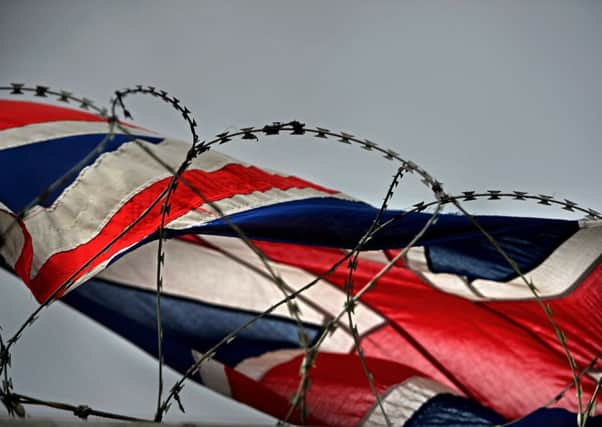Scottish independence: New poll shows Yes shift


The new survey for Scotland on Sunday suggests a swing of just five percentage points would bring Scotland to the cusp of independence, while a large proportion of the population remain unconvinced that a No vote would deliver the more powerful Scottish Parliament that they want.
The poll, conducted by ICM Research, found that 39 per cent of the 1,010 people sampled would vote Yes in the referendum – an increase of two percentage points on the previous month.
Advertisement
Hide AdAdvertisement
Hide AdThe percentage of No votes fell from 49 in February to 46 per cent, leaving the proportion of “don’t knows” at 15 per cent (down one percentage point on last month).
A gap looked narrower still when the “don’t knows” were excluded from the analysis.
When the undecided were discounted, Yes support was at 45 per cent, an increase of two percentage points since February. The No support stood at 55 per cent, a fall of two percentage points over the same period.
The poll was conducted last week around the time that Scottish Labour published its Devolution Commission, recommending that fresh powers ought to be devolved in Holyrood if Scotland votes No.
According to the poll, less than two-fifths of Scots believe Scotland would be given more powers if the country rejects independence. That contrasted with the 68 per cent who believe that Holyrood should be given responsibility for tax and welfare.
ICM’s findings prompted the independent polling expert Professor John Curtice to say that Better Together is “beginning to look like a campaign in trouble”.
Writing in today’s Scotland on Sunday, Curtice said: “Frightening voters with messages of economic doom and gloom is not working…a more confident and convincing vision is needed.”
The results of the poll, conducted between 17 and 21 March, were interpreted by Yes Scotland as evidence that only a vote for independence will result in a stronger Holyrood.
Advertisement
Hide AdAdvertisement
Hide AdBlair Jenkins, chief executive of the Yes Scotland campaign said he was confident of achieving the swing required to win. “We’ll continue to step up our campaign work in all of Scotland’s communities in the months ahead,” he said.
“It is the highest Yes rating in an ICM poll since January 2012, and this poll also suggests that a majority of people in Scotland don’t believe that the Scottish Parliament would get more powers if there was a No vote – that is why a Yes vote is so important.
“It’s yet another poll confirming that more and more people are moving to Yes. More people in Scotland are realising that the additional powers being talked about by the anti-independence parties are far too weak and limited, as well as unlikely to be delivered.”
Jenkins added: “We already know that Scotland can be independent. Scotland is the 14th wealthiest country among the developed economies in terms of GDP per head – compared to the UK’s 18th place. And as Scots weigh up the consequences of a No vote, more and more people are realising that we should and must become independent as well.”
The Better Together campaign sought solace from previous polls.
“This poll shows that the gap between Yes and No is exactly the same as it was two months ago,” a Better Together spokesman said.
“While we can take comfort from the fact that this poll, like all others, shows that a clear majority of us want to remain in the UK, we need to make sure that we are fighting for every vote between now and September.
“The choice we face in the referendum is clear: do we want to take a huge leap into the unknown with independence, or do we want to have an enhanced Scottish Parliament backed up by the strength, security and stability of the UK?”
Advertisement
Hide AdAdvertisement
Hide AdThe poll also revealed that independence was gaining support among the middle classes. Yes support in the ABC1 social grade rose from 36 per cent last month to 39 per cent in this most recent poll. Support for the UK fell one percentage point from 52 per cent to 51 per cent among the ABC1s.
At the poorer end of the scale, there was also a rise in Yes support. In the C2DE social grade independence support went up to 39 per cent from 38 per cent. While No support fell from 46 per cent to 43 per cent.
Meanwhile, the Yes campaign last night hailed an academic paper criticising Chancellor George Osborne’s refusal to countenance an independent Scotland having a formal currency union with the rest of the UK. Osborne’s position has been supported by Labour and the Liberal Democrats.
The paper by Leslie Young, Professor of Economics at the Cheung Kong Graduate School of Business, Beijing, described Osborne’s position as “misleading” and claimed that objections on the grounds that Scotland’s large financial sector would expose the rest of the UK to risks were “unsubstantiated”.
Jenkins said: “This forensic analysis from a respected economist exposes the fact that the anti-independence parties’ opposition to a currency union is purely political and designed to scare people into voting No – the rise in support for Yes shows it’s backfiring. As it is now abundantly clear, a formal currency union makes sense not only for Scotland, but for the rest of the UK as well.”
A Treasury spokesman said: “A currency union is not going to happen. The UK government has set out detailed analysis supported by numerous independent voices as to why a currency union is not in the interests of an independent Scotland or the remaining UK.
“This decision is not going to change. This means less than six months from the referendum, the Scottish Government still has no plan for what currency they would use.”